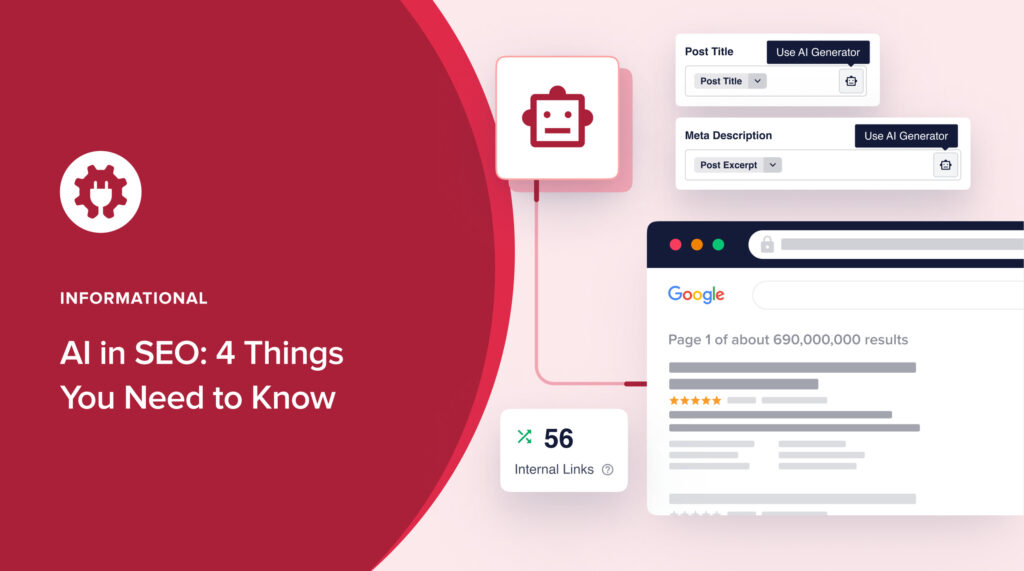Would you like to know the impact and use of AI in SEO?
AI is fast becoming a hot topic in the world of SEO. That’s because it’s helping many digital marketers and small business owners execute SEO tasks quicker and more efficiently.
In this article, we’ll look at the role of AI in SEO and some considerations to make as you embrace AI in your SEO strategy.
In This Article
Understanding AI and SEO
To best understand AI in SEO, let’s briefly examine these two acronyms.
Artificial intelligence (AI) is an umbrella term that covers several different technologies, including machine learning (ML), natural language processing (NLP), deep learning, computer vision, and other emerging technologies. These technologies are designed to help machines perform specific cognitive tasks as well as, or better than humans.
On the other hand, search engine optimization (SEO) enhances your website and web pages to drive organic traffic from search engines like Google. If you follow WordPress SEO best practices on your site, search engines quickly discover your content and display it in the search results.
Therefore, AI in SEO uses AI technology to optimize your website and content for search engines and users. Doing so helps you easily scale your SEO campaigns and execute tasks faster and more efficiently. As a result, your chances of ranking high on search engine results pages (SERPs) are bolstered.
AI in SEO Has Been Around Longer than You Think
AI has been a part of SEO for years. In fact, search engines like Google have been integrating AI in their algorithms to determine how to rank content since the RankBrain update in 2015. And with the introduction of Google’s BARD, AI is soon going to have a prominent role in SEO.
The recent shifts in the capabilities of AI have catapulted AI SEO tools into the future. Because of this, the way SEO tasks are performed has greatly changed. That’s because AI can help you with many tasks, including:
- Link building
- Generating SEO titles and meta descriptions
- Discovering ranking opportunities
- Content optimization
- And more
This brings us to one of the latest developments in AI for SEO: ChatGPT.
What is ChatGPT (And How has it Revolutionized AI in SEO)?
ChatGPT is an artificial intelligence (AI) chatbot developed by OpenAI, an AI research company. Released in November 2022, this revolutionary tool can help you with:
- Carrying out conversations
- Writing articles, academic essays, and emails
- Writing code
- And much more
And because of its powerful capabilities, ChatGPT has already gained over 100 million users and has become a hot topic in every industry, particularly in digital marketing circles.
Today, ChatGPT has revolutionized the way AI is used in SEO. For one, many SEO plugins are now being built on the ChatGPT platform, and many others are incorporating it to make them more powerful. Because of this, many marketers and SEOs are using AI-powered SEO tools and software to gain an edge over their competitors.
But with all the hype around AI, the question is: is it a fad or the future of SEO?
AI in SEO: 4 Things You Need to Know
Now that you know what AI is and what it’s used for in SEO, let’s look at some interesting use cases you can implement.
1. AI Offers Many Powerful SEO Tools
With the onset of using AI in SEO, AI has improved many SEO tools. An excellent example is All In One SEO (AIOSEO).
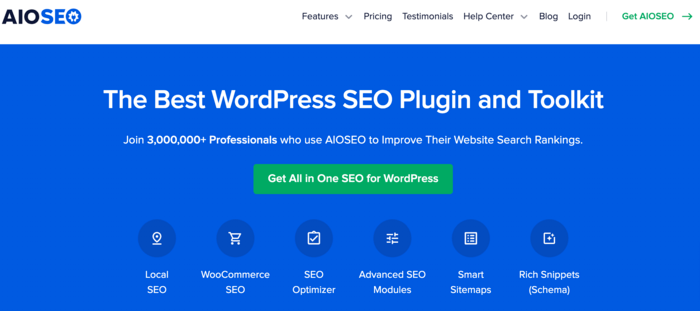
AIOSEO is a powerful yet easy-to-use SEO plugin that has been downloaded over 100 million times. Millions of smart bloggers use AIOSEO to help them boost their search engine rankings and drive qualified traffic to their blogs. That’s because the plugin has many powerful features and modules designed to help you properly configure your SEO settings. Examples include:
- Search Statistics: This powerful Google Search Console integration lets you track your keyword rankings and see important SEO metrics with 1-click and more.
- Next-gen Schema generator: This no-code schema generator enables users to generate and output any schema markup on your site.
- Redirection Manager: Helps you manage redirects and eliminate 404 errors, making it easier for search engines to crawl and index your site.
- SEO Preview: This gives you an overview of your search and social snippets and general SEO so you can improve your optimization.
- IndexNow: For fast indexing on search engines that support the IndexNow protocol (like Bing and Yandex).
- Sitemap generator: Automatically generate different sitemaps to notify all search engines of any updates on your site.
- And more.
AIOSEO also has some SEO modules that are powered by AI, namely the AI Title/Description Generator and Link Assistant.
AI Title/Description Generator
AIOSEO’s AI Title/Description Generator helps take the labor out of crafting post titles and meta descriptions as it automatically does this at a click of a button.
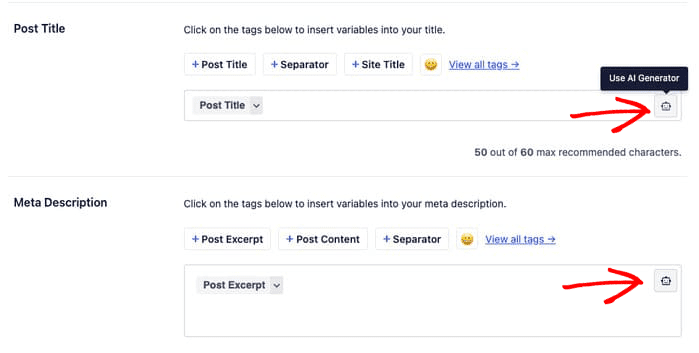
The AI engine then creates 5 suggestions based on your content…
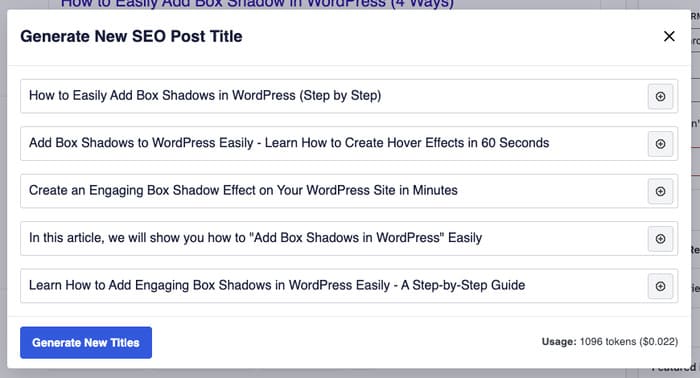
All you need to do is select the one you want and tweak it if necessary.
With optimized SEO post titles and meta descriptions, your content will:
- Rank higher on search engines
- Gain more visibility on SERPs
- Drive more traffic to your site
And all it takes to gain these results is a simple click of a button!
Link Assistant
Another AI-powered feature is Link Assistant, our internal link-building module.
Link Assistant automates internal link building by crawling your site to check for internal linking opportunities. The Overview shows you the number of external and internal links and the affiliate links on your site.
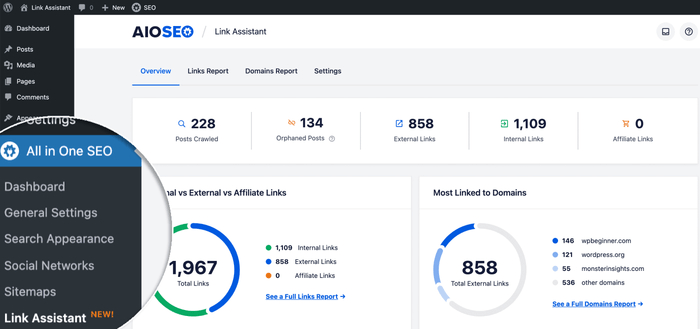
You can also get a more detailed report of the links on your site by clicking on the Links Report. It then gives you a report with Linking Suggestions and shows you the Orphan Posts on your site.
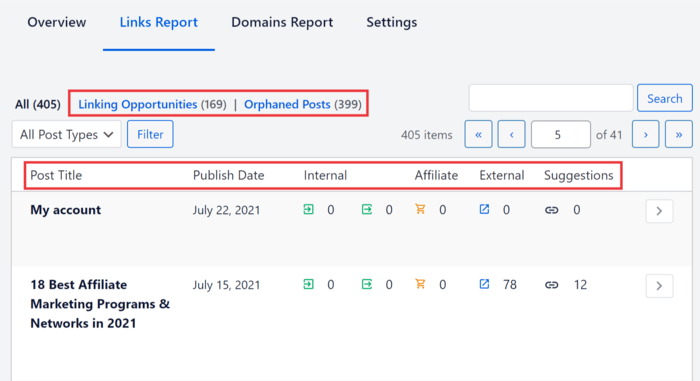
The best part is that you don’t have to open the target page to add the suggested links. Instead, open the Links Report and click on a post or page. Doing so will open a window with internal inbound and internal outbound link suggestions.
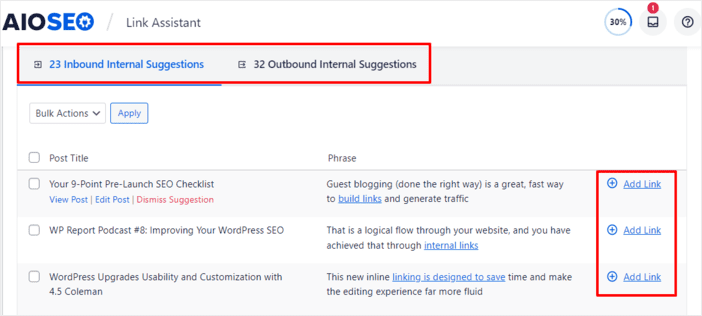
This level of automation just makes the internal linking process faster and more efficient.
If you’re looking for the best WordPress AI plugin, then look no further than AIOSEO. Because it’s an easy-to-use plugin, and you don’t need any coding or technical knowledge to use it to its full potential.
For step-by-step instructions on how to install AIOSEO, check out our installation guide.
Besides AIOSEO, many other SEO tools and plugins incorporate AI into their feature sets. Here’s a list of some of the best AI SEO tools for various SEO tasks.
2. AI is Not a Silver Bullet
Although AI is powerful, don’t get misled into thinking it will make you the number 1 listing on SERPs. That’s especially true in the case of content creation.
AI is a tool. And like all tools, no matter the industry, a tool is only as good as the person who uses it. You still need to know how to use the tools effectively.
That’s why you must not think AI will magically do all the work for you. For example, when getting AI to create content, you need to master the right prompts to help you get the most out of the tool. And even if you use the right prompts, you still need to go through the content to verify facts and ensure grammatical correctness.
This brings us to the next point.
3. Search Engines Still Prefer Human-Generated Content
While AI-powered content tools are becoming increasingly better at creating content, they still have one major flaw: they are just advanced article spinners. This means they are incapable of conducting their own research and providing opinions. Instead, they parse through content on the internet and create content based on that.
Because of this, search engines use AI detectors to scan content so they can know if your content was created by AI or by a human writer. Even if your AI content creation tool is good enough to avoid detection today, it may get detected as search engines develop better tools to spot AI-generated content.
Search engines like Google discourage AI-generated content because it doesn’t meet E-E-A-T standards. To get past this, use your AI writer as a prompt for your article, then polish it up by adding your expertise, validating facts, and editing it to align it with your voice.
4. The AI Revolution is Leading to the Rise of Answer Engine Optimization (AEO)
Answer engine optimization (AEO) is a subset of SEO that focuses on providing users with direct answers to their queries on search engines. It is often in the form of a featured snippet, knowledge panel, or AI assistants in search engines like Bing AI or Google’s Bard.
AEO aims to provide the most relevant and accurate answer to a user’s query and display it by search engines.
With search engines heavily relying on AI to rank content, SEO has moved away from being keyword-focused to search intent-focused. This means your SEO strategy should now focus on proving to search engines that your content and brand are relevant to users’ search queries. One way of doing this is to use FAQs in your content. This results in your search snippets being more prominent on SERPs.
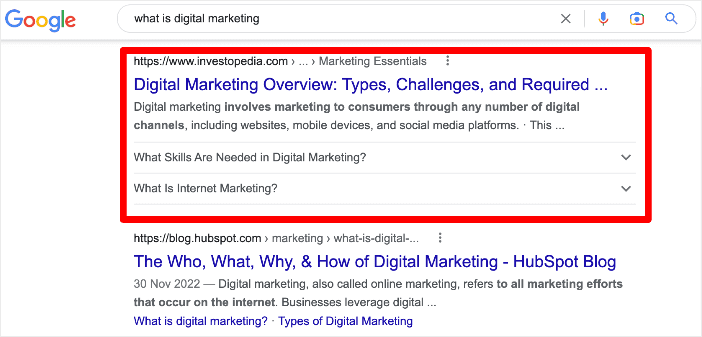
FAQs can also help boost your SEO and improve your organic clickthrough rates (CTR).
Another way of boosting your AEO is to build strategic internal links in your content. This is super easy with an AI-powered tool like Link Assistant. By building internal links, you build topical authority, and search engines will value your answers more, leading to higher search rankings.
AI in SEO: Your FAQs Answered
What is AI SEO?
AI SEO is the use of artificial intelligence (AI) to help boost your rankings and visibility on search engines.
What are the best AI SEO tools?
The best AI SEO tools are built with SEO in mind. Great examples include AIOSEO, Link Whisper, and Surfer SEO.
Is AI taking over SEO?
While AI may be changing how SEO is done, it is in no way taking over SEO.
AI in SEO: The Future is Here
AI is bringing so many positive benefits to SEOs and marketers. But if you’re a small business owner, you must understand what you get when using AI in your search strategy.
We hope this article helped you know what to expect with AI in SEO. You may also want to check out other articles on our blog, like our ultimate WordPress SEO guide or our guide to finding and fixing broken links in WordPress.
If you found this article helpful, then please subscribe to our YouTube Channel. You’ll find many more helpful tutorials there. You can also follow us on Twitter, LinkedIn, or Facebook to stay in the loop.
Disclosure: Our content is reader-supported. This means if you click on some of our links, then we may earn a commission. We only recommend products that we believe will add value to our readers.
